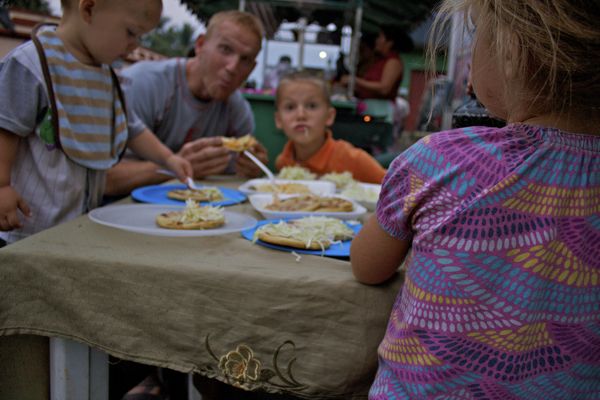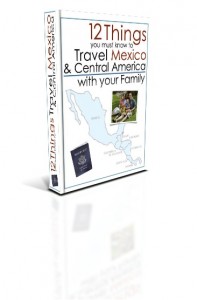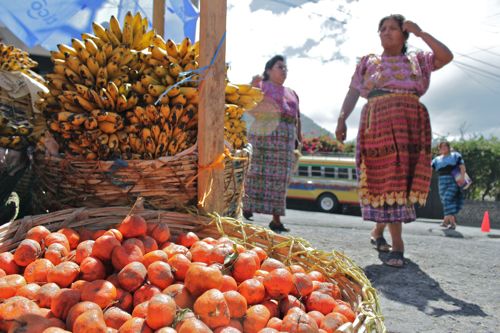
Eating pupusas at a roadside stand in Guatemala
I recently received this email from a friend, and I thought I would share my answers with you, my readers, in case you have some of the same questions:
The closer we get to traveling the more and more questions I am asking myself in my mind and the more and more I want to talk to seasoned travelers like you! O.K. here goes my questions:
Driving:
If we did take our vehicle down (into Central America/Costa Rica) what are the taxes and problems you will run into? Are there taxes in each country to take your car in?
[message type="custom" width="100%" start_color="#FFFFFF" end_color="#FBF8FF" border ="non" color=""][one_fourth]
 [/one_fourth] [three_fourth_last]Make sure to get my book on driving Mexico and Central America with your family.
[/one_fourth] [three_fourth_last]Make sure to get my book on driving Mexico and Central America with your family.
Everything you need to know about border crossings, safety, paperwork and much more!
[/three_fourth_last][/message]
Driving through Mexico and Central America is a wonderful experience, and I recommend it. When you cross into each country, you will need to provide proof of ownership (title) and/or registration; show your drivers license (you can buy an international driving permit from AAA); passport; and then get a vehicle permit.
In Mexico, for our 1999 Ford F250, the vehicle permit was about $47 and was valid for 180 days. In Belize the permit was free, and valid for about 90 days. In Guatemala, the permit was about $25 and valid for 90 days. If you are there longer, then you will just have to go to the border or immigration office and renew the permit (for free).
Mexico also requires that you pay a refundable deposit - between $200-$400 (depending on the age of your vehicle) which you will get back once you leave the country.
We would like to stay in Costa Rica indefinitely, so would that work having our car there? I don't quite understand the ins and outs of taking your own vehicle. You guys did it for a year, so I know that it's possible. What did you have to do to keep your car there for a year?
Costa Rica is an expensive place to live, and buying/getting a vehicle is even more expensive. You can bring your car in on a 90 day vehicle permit, and then you can renew it one time (so 180 days total). We did have our vehicle there for one year, but that required the help of an attorney, and it was pricey.
If you import your vehicle to keep it there permanently, they charge you 40% of the vehicles value in importation fees.
(As a side note, although we absolutely loved our time in Costa Rica, it may be the most expensive country in Central America. Be prepared to pay U.S. comparable prices for housing, food, etc. Many imported items, such as vehicles, appliances, and food, are heavily taxed, so it often costs more than it would in the U.S. A great inexpensive country to live in? Guatemala!)
Would our little Subaru be O.K. or would you really suggest a truck or 4-wheeler vehicle?
You would be fine driving a small car. Many of the roads are in good condition, but those that aren't are still manageable with a small vehicle (unless you're doing some off-roading).
Bites from sand flies while in Belize
Bugs and disease:
Do you take anything for mosquito spread diseases (i.e. malaria)? Do you do the antibiotics? I really don't want to do that! I know you've been into natural remedies. I know there are natural mosquito repellants, so I will probably rely on that. My family, most especially my children getting sick, has been my largest concern! I finally bit the bullet and we are getting our vaccinations in a week!!!
Personally, we have chosen not to take any of the malaria pills (even when we traveled to India). After doing some research, we felt that the possible side effects could be as bad as having malaria itself, so we opted to focus on prevention. We do use bug spray, and wear long pants and long sleeves in buggy areas, and in the evenings and mornings when mosquitoes are out.
I do use natural remedies for our health care needs - bug bites, etc. I haven't really used them for preventing bug bites though.
We also chose not to get vaccinations for our family - except for a select few when we went to India. But while traveling through Central America, we have not gotten any of those recommended vaccines. Again, we feel that risks from side effects are about equal to the risk/chance of catching the disease.

The market in Panajachel, Guatemala
Local foods:
I also wonder if your family is O.K. eating local foods? Do you guys have any anti-worm drugs? Do you ever get bad digestive issues with eating local food? I know you have some vaccinations.
Our family will eat the local food any chance we get. We do all of our shopping at the local markets, and if we eat out, it's usually at a road side stand or comedor.
Yes, sometimes we do get sick, and get some diarrhea, but it also helps to build up our immune system so that our chances of getting sick in the future decreases.
Again, we do not have any/many vaccinations, except for a few we got when traveling to India in 2010.
I may ask more questions! But these are my main concerns!
Are there any questions that you have? Leave them in the comments below.
Comments
Powered by New Facebook Comments


We hope to be on the road traveling soon with our crew, and have had many of these same questions. Glad to read your responses, Rachel.
I’m actually curious about when you’ve actually been in Yellow Fever territory and are trying to enter another area (ie leaving Panama for ???) if you will encounter problems if you haven’t been vaccinated. I hear that’s when there might be an issue. I am totally not in favour of getting vaccinations routinely, but will have to reconsider specific ones I suppose if we really want to go to particular countries.
How do you plan to deal with the Darien Gap?
To date, we have never been ‘checked’ as to whether or not we’ve had vaccinations. I think they’re simply ‘recommended’ but never enforced. As for Yellow Fever, we haven’t had a problem with that yet (getting into/leaving an area).
Thanks so much for answering my questions Rachel! This really helps out. I just found another very helpful website, (driving the americas). That has answered questions about border crossing and cars. I am very grateful to learn as much as I can now! Oh man! Your response is making me second guess vaccinations!
You’re very welcome.
Thank you for kindly open yourselves to all of us and help us get a little closer to start family traveling. Everyday I am telling my kids and husband that we ARE traveling the world. Most of the time I answer their questions starting with : “when we are traveling the world…. But anyhow: my husband seems to be very concern about crossing Honduras and The El Salvador territory due to the criminals activity , gangs and stuff. Do you think the news are over-stating the facts….? Do we need “security” and a run non stop throuh these countries??? I know you probably dnt want to give them a bad name or discourage people from their travels but I need to know what did uou actually do because I dobt see entries from this countries on your site.
Thanks for your help, always!
Vanessa
Hi Vanessa,
I think the news is probably over stating the facts. Honduras is a beautiful country, we absolutely loved it there (we drove through in 2007). We have not been to El Salvador, but it is next on the list. We will be there before the end of the year, and plan on spending some time. So you’ll be able to read our updates then 🙂 But I KNOW they are both safe to drive through and visit.
hi Rachel, I have a question regarding water. Do you guys buy bottled water or you still use your water filter?
We buy bottled water, but we are looking at installing a water filter on the truck so we can get water from anywhere and drink it.
I think I’m with you on taking malaria pills. I’ve taken them into a few places and I’ve also gone to a few without them. So far, they don’t seem all that worth it. I don’t usually experience too many side effects from the, but I did experience nightmares. Overall, I think I’d rather just enjoy and forget about them.
Agree 🙂
Another important point to consider is that if you bring a Subaru in Costa Rica, you will really look like a gringo since there is no Subaru there and you will be a target for police officers. They might find a good reason to give you a ticket and get money from you. It happened to a good friend. We decided to buy a vehicle there and we blended in much better. If you decide to bring a vehicle down there, make sure it is at least 10 years old AND that it is a common vehicle in Costa Rica.
We have actually seen almost every kind of vehicle on the road through Central America, new and old. Buying a vehicle does have some benefits, but if you’re wanting to get their via a vehicle, it’s great to bring your own.
Are you able to expound a bit more on the process to keep your vehicle in Costa Rica for a longer period than 180 days? Any chance you remember who the lawyer was?
What would happen if it was there for 180 days, you left for a few weeks, then came back? Is that doable?
Thanks!
Yes, we still have connections with the lawyer…
Your idea may work, though I am not entirely sure. They may have a six month in a year limitation, or something like that. Our lawyer friend would know. 🙂
@Rachel: You’re being a lawyer tease 🙂 How do I find this marvelous Squire?
I’ll send you a facebook message. 🙂
Also, I know you guys have pulled over in fields to just sleep on the side of the road. Any tricks for how to do that safely? How to find a good spot?
There is so much open space in Mexico and Central America, any dirt road that turns off the dirt road that leads off the highway, that goes off into nowhere would work great. Any time we did run into anyone, it was usually the farmer who owned the field (and was more than happy to let us stay), or the morning workers (like at the gravel pit we camped near) who just drove around us to get to work.
One time, we camped in a place that could be seen from the main road/freeway. As soon as it got dark, the police came by and said, “Everyone in town knows you’re here, we’d feel better if you camped by the police station tonight.” So we did.
@Rachel: Thanks for the tips. I’m leaving mid October and am pretty stoked.
Awesome! I’m sure you’ll be ‘passing by’ us, you’ll have to stop and say ‘hi’!
Hi Rachel
I’m just wondering about vehicle insurance for Guatemala. Two other references mentioned American International Union out of Texas with a website. The address doesn’t work so perhaps the company doesn’t exist anymore. Who do you have your Guatemala insurance with?
Also – is an international driver’s license mandatory?
Thanks!
Hi Teresa,
An international driver’s license is not mandatory, but it can be helpful. If you are ever pulled over by a police office who asks to see your license, you can give them your international driver’s license. Then if they try to get you to pay a bribe (NEVER pay bribes – they are illegal!) and they threaten to keep your driver’s license as ‘ransom’ (a common tactic), you can say, ‘okay’, with a big smile on your face. No harm done. What usually happens is they figure out you’re not going to pay a bribe and give the license back and send you on your way 🙂
As for insurance, U.S. insurance is not valid outside of the country. You can buy insurance that covers you in the country that you’re traveling to at the borders, or in the major cities (i.e. Guatemala City).
If you really will go to Argentina one day (as I understood is you plan), how will you cross the Darién gap?
When we reach the Darien Gap, then we will place our vehicle in a shipping container, and we’ll meet it in Colombia. We will probably sail across 😉
Rachel, do you know anything about traveling with dogs? We have two short/long 25 pounders…
@Corey:
We actually brought them from Costa Rica. I’m familiar with requirements for air travel between FL and San Jose, but am clueless when it comes to driving between countries… especially if it lasts longer than 30 days. :/ Thanks!
Corey,
I don’t know very much, but here’s what I do know:
1. You do need a vet certification that’s about 30 days old. If it expires, you can get a new one in whatever country you’re visiting.
2. Many people we’ve talked to who have taken their pets say that usually they just keep them in the car, and if the border patrol sees them, they usually just let them through. If not, then you’ll have to fill out some paperwork, show your vet certificate, pay a the ‘pet fee’ and you’re on your way. It’s not too difficult, from what we’ve been told.
Thanks, Rachel! And I definitely want to get that new book of yours! 😀
Hi,
I just discovered this site. I am a recently retired army guy who is interested in driving to Central American this winter. I was planning to live part time in Costa Rica, but in viewing some of the comments, I see that CR might not be the cheapest or most interesting place to live. I am considering going this January. Driving a 1997 Nissan Pickup Truck that should blend in rather well in Central America. I just want to get the ins and outs on crossing borders, preventing arrest, bandits, etc. I would love to connect with people who have done this sort of thing. I have spent some time in Central and South America while in the military so I have some experience with the culture. Thanks for your help.
Mack
MackDawg72 Hi! Driving is a wonderful way to experience the countries and culture. Costa Rica is definitely not the most inexpensive, but it IS interesting… tons to see and do. Feel free to contact me on my Facebook page (http://www.facebook.com/discovershareinspire) with any specific questions you have.